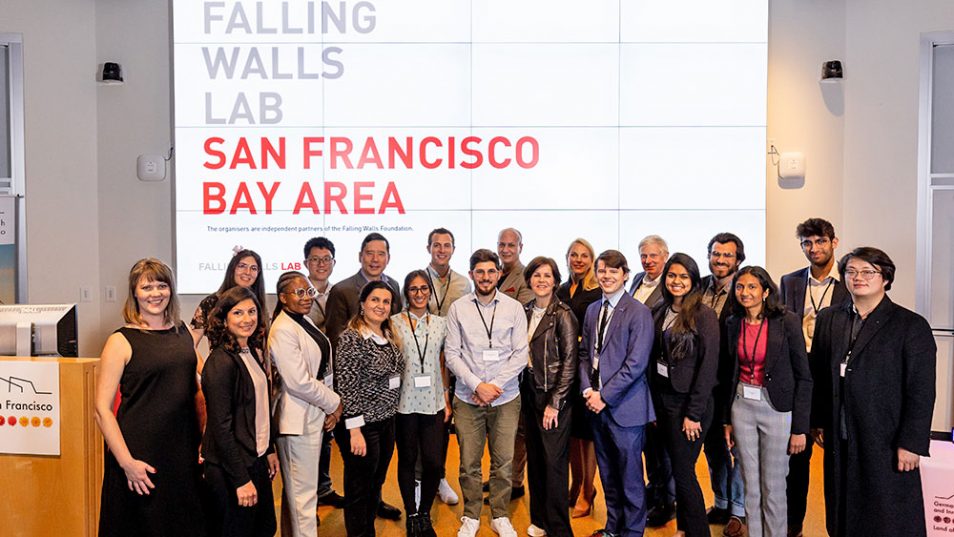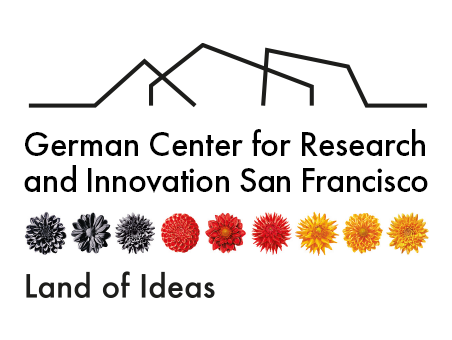Ideas for the future
 © Barak Shrama
© Barak Shrama
One of the most important tasks of the DWIH is to promote the transfer of research to application. At the end of September 2022, young researchers had the opportunity to present their ideas and network with partners at the Falling Walls Lab San Francisco.
Seaweed is regarded as a secret weapon in the fight against climate change: one square kilometer of the marine plant stores almost twice as much carbon from climate-damaging CO2 as the same area of forest on land. And it also grows incredibly fast, too, doubling its biomass within a week. For this reason, experiments are currently underway that involve large, mobile seaweed farms being towed across the oceans by ships. Unfortunately, this method is not cost-effective, however, since the structures are too heavy, and the transport is too energy-intensive.
Young AI researcher Marius Wiggert from the University of California (UC) Berkeley, has had a clever idea here: why not draw on the large and powerful ocean currents to keep the seaweed farms on the required course? After all, this is how sea turtles keep moving for thousands of kilometers without tiring. The currents themselves are detected and utilised by a control software that uses machine learning. “Navigating Seaweed Growth Platforms by Leveraging Ocean Currents and Machine Learning” is the title of Wiggert’s project, which he is looking to implement together with MIT. He presented it on September 28, 2022 at the Falling Walls Lab San Francisco, an event organized by the German Center for Research and Innovation (DWIH).
Interdisciplinary jury
“For us, this was a crucial premiere to establish ourselves as a new institution in the Bay Area and raise our profile among younger, aspiring researchers in particular,” says Dr. Zahar Barth-Manzoori, Director of DWIH San Francisco, which began its work at the end of April 2023 – now the sixth DWIH worldwide. 29 applicants from universities across the region applied to take part in the Falling Walls Lab, with 16 finalists finally being invited to present a three-minute pitch that was then judged by a seven-member transatlantic and interdisciplinary jury. Members of the latter included German studies specialist Professor Jeroen Dewulf and chemist Professor Ting Xu, both from Berkeley University, as well as German personnel and organizational psychologist Professor Sabine Remdisch from Leuphana University of Lüneburg.
Marius Wiggert was able to secure second place with his idea in the field of environment and climate. The winner of the event is working on a revolutionary approach in the field of medical research: molecular biologist and entrepreneur Dr. Vishnu Sunil has developed a process to produce a hemostatic material for wound care. Based on nanostructures, it enables rapid blood clotting. The aim is to significantly reduce the risk of blood loss and secondary bleeding while at the same time preventing infections. “This material can be flexibly applied to gauze, injectable pellets and wound balloons to treat different bleeding situations,” explains Sunil, who is currently an Innovation Fellow with Novartis in Emeryville. A patent has already been applied for and clinical trials are currently underway.
Key contacts in Germany
Events like the Falling Walls Lab are a great opportunity for young researchers like Marius Wiggert and Vishnu Sunil to grow their network and gain supporters for their projects. “We’re more than happy to help set up the relevant contacts, of course,” says Zahar Barth-Manzoori. “After all, that’s essentially one of our main tasks as an institution – to promote interesting approaches from science based on collaborative ventures and help find a way to get them put into practice with the help of industry partners.” Vishnu Sunil moved to the Bay Area from Singapore so as to “take advantage of the vibrant start-up ecosystem, engage in networking and make contacts”, he says. “I just wanted to make sure I had the mentors and resources I needed so as to be able to take my research from the lab and have it put to use to the benefit of patients.”
The transatlantic dimension is a key factor here, too. Like all first and second place winners of the worldwide Falling Walls Labs, Wiggert and Sunil had the opportunity to travel to Berlin for the major final event, which is held in the German capital in November each year. Vishnu Sunil emphasizes just how worthwhile this journey is: “Participating in the Falling Walls Lab in Berkeley and in the Berlin Science Week was a marvelous experience: not only did I meet a lot of highly qualified researchers and scientists, I also got an insight into the start-up environment in Germany and the opportunities it offers to build great technology companies.”
Klaus Lüber
